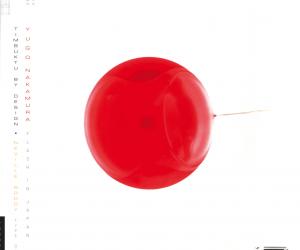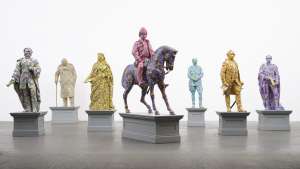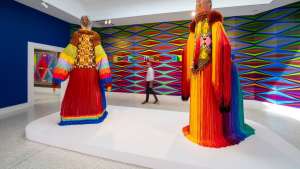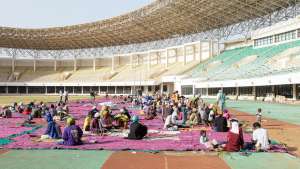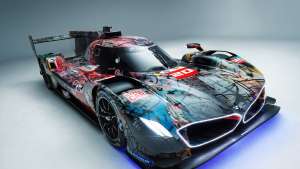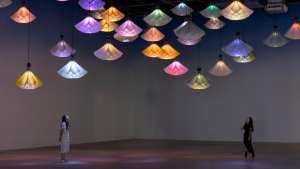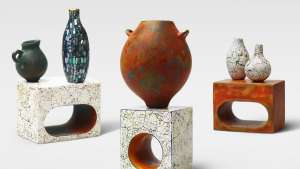First Published in

As in all art, what makes a picture perfect is composition, colour and light. The interest value of the subject is the most important thing. Luckily, I don't get hooked into the models' sexuality. I do my best to remain objective and I guess some models sense that and can relax more. That's the key to a good picture in fashion photography - getting the model to relax. I remember a couple of male photographers expecting me to "get off" with the camera. It never worked, just made me angry and want to get out of there as soon as possible.
Having worked on the other side of the lens, I probably look at women through the lens with a bit more sympathy. In the end they're just people - you pick up when they're tired or have had enough. Although I tend to think more about the photograph far more than the subject, that person has to work with me to produce it, so I have to help them along. You're in shit if the model can't work! If she can't pick up the mood at that time, it isn't going to happen. The model I used here was very good that way.
This shoot is quite sexy, but my intention wasn't to get 'turned on' or 'turn other people on.' Often with some male photographers, you get that overt 'sex' thing and the pictures become something else. I don't buy into the guilt trip that those of us working in the media and creating visual images are feeding the frenzy of unhealthy social and physical aspirations. In the end, it's about creativity. And as long as it's important to me to "create" in this medium, I will exercise my freedom to do so.
During my career I felt exploited in that I saw people were only interested from a money point of view. They didn't give a shit about the person behind the picture. But exploitation by people in the business and by the art form itself are two different things. I felt exploited by my agent at the time. But never by the camera. I've been in fashion for 17 years and I wouldn't say I was a victim. I've chosen not to buy into that whole victim thing. Whatever we do in the end is an individual choice. If somebody knows what they're doing and doesn't mind being in front of the lens, that's not exploitation.
I did a children's shoot the other day for a catalogue.
These kids were like two and four years old and they had to sit around the whole day waiting to be photographed and they didn't want to be there. That was exploitation.
Some years ago, I photographed a 60-year old prostitute for an exhibition. I wanted to capture what she was about and what her work was about in the shot. It was quite hectic. It was like capturing a bit of the dark side of life. But I didn't feel sorry for her. I paid her. It was an equal exchange. She posed and she got paid, instead of earning it her usual way. In a way, the street kid I shot for the same project was more interesting. I got one shot of him where he was looking really proud and strong. And I found that deeply moving because here was this guy with nothing, living a life he hadn't chosen. The prostitute? This woman had made a life decision.
I can't define beauty, but I know what it means to me. Beauty and perfection are too ephemeral. They're difficult to define; too big. Beauty is also such a personal concept. Beauty is often in a moment, for me. I find some people beautiful even when they're technically not. I am far more interested in shooting women than men. There have been a few male models I've gone "wow" over but I've always felt that modelling becomes women more than men. There've only been one or two models that I've wanted to photograph twice. These 'perfect' GQ-like male models don't do anything for me. To me, there are very few male models who offer 'more.'
I've always enjoyed people's faces more than their bodies. Bodies you can work on. Faces, good ones, are unique. Beauty, or an expression of it, comes from the eyes - they are the storytellers beyond all else. Make up has its place. I've worked with some of the best make up artists and photographers in the business so I recognise "good" make up, although I wouldn't know how to put it on myself! That's why I don't wear it. Actually, I find there are very few women who enhance their features by wearing all this shit on their faces.
Having said that, I find retouching absolutely acceptable, even essential. That's possibly a contradiction with what I've just said, but I don't care - we all have contradictions in our lives.
What happens in photographs and what happens in real life are two very different things. I choose not to make myself look like myself in my days as a model. It was beautiful… but not real. My holiday snaps with my son are beautiful and real. For fashion, you want a perfectly finished product - retouching helps you achieve that. I'm not saying you have to be a perfectly finished product in real life. They're two different things. My photography is work and how I see other people in real life is different. Unless you're shooting for yourself it IS just work. It's taken me a few years to figure this out. When you start out you think you're aspiring to this 'thing' only to discover it's something else completely. It's not working in a bank… but it is still work.
I enjoy photography. Unfortunately, after working for a while you forget why you ever started. At the moment I'm trying to regain my first passion, why I used to enjoy it, why it was the only thing I ever wanted to do… after 30, that is! I went to the Malay quarter one day at seven o'clock in the morning, and there was this guy feeding the pigeons and they were all over him. It would have made an amazing shot. For me, it revealed more than fashion ever could. I'd like to get into something more real for myself. Like holiday snaps - just capturing moods or emotions. Which you want to do in fashion anyway but in the end it's like, well, "clothes."

